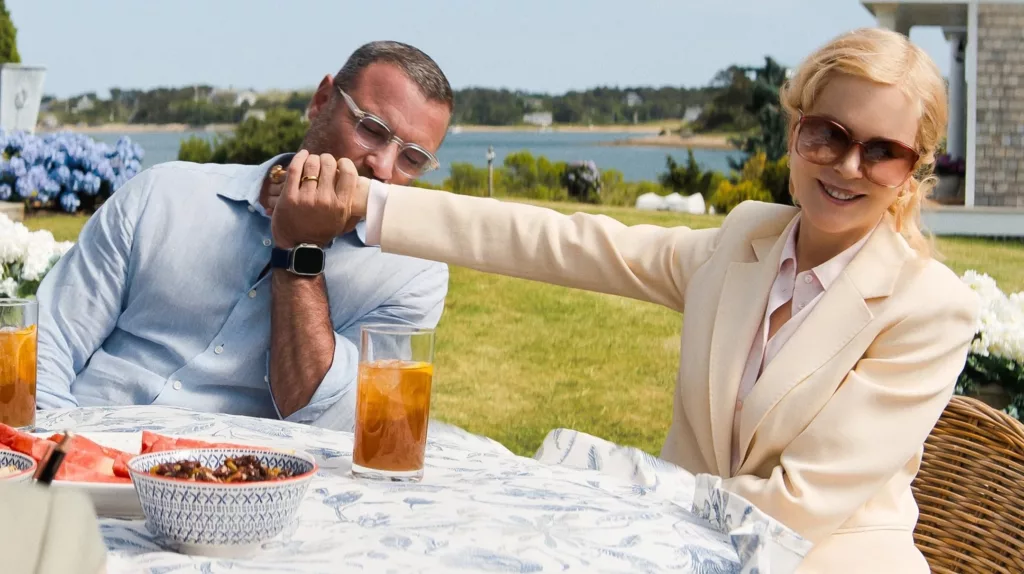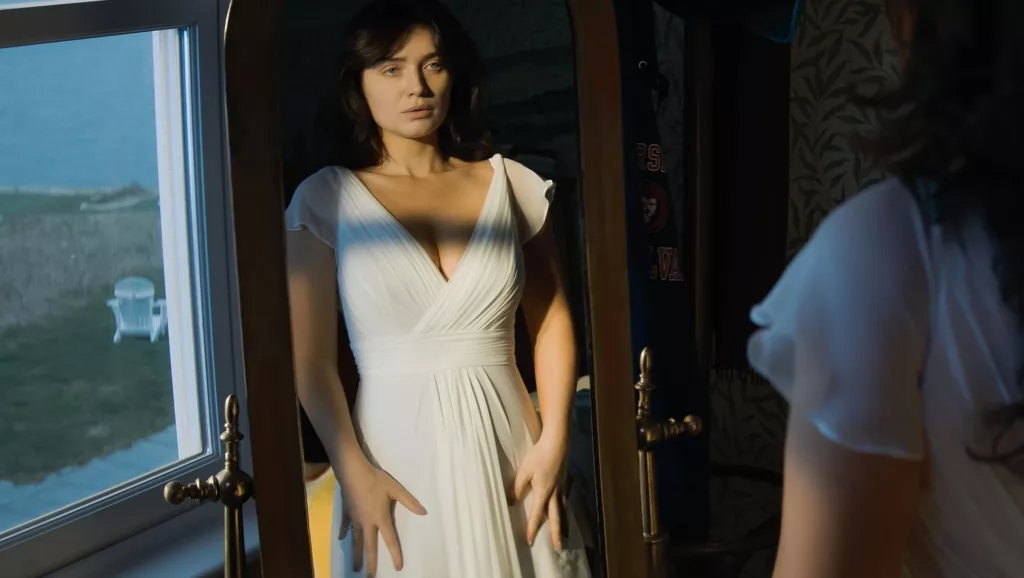The buzz for The Perfect Couple started well before its premiere on Netflix last summer. Adapted from Elin Hilderbrand’s novel of the same name, the series promised lavish drama along with a not-so-perfect family. Set on Nantucket Island, it centers around the wealthy Winburys and the events unfolding during a wedding weekend at their sprawling Summerland estate.
Leading the cast is Nicole Kidman as Greer Garrison Winbury, the formidable matriarch of the family. An internationally famous novelist, Greer effortlessly wields control over her brood. Liev Schreiber co-stars as her husband Tag, who seems charming on the surface but harbors secrets of his own. At the center of the wedding is their middle son Benji, played by Billy Howle, who is marrying Eve Hewson’s character Amelia against Greer’s wishes.
Directed by Susanne Bier, known for nuanced thrillers like The Undoing, the series promises intrigue and twisting mysteries along with its gorgeous New England scenery. And it delivers a drama packed with dysfunctional characters, dark pasts, and a death that upends the wedding weekend. However, peeking behind the Winburys’ polished facade reveals far more disturbing truths lie within Summerland’s stately walls. Over its six stylishly shot episodes, the whodunnit slowly unravels while exposing fractures in the perfect lives this wealthy clan projects.
With its focus on class and privilege, as well as stellar performances from Kidman, Hewson, and the rest of the ensemble, The Perfect Couple looked poised to captivate viewers last summer. But does its style overcome potential traps of formula and predictability? Only one way to find out—dive into the secrets of Summerland.
Hidden Dysfunctions
This limited series wastes no time diving into its story and introducing us to the sprawling cast of characters inhabiting Netflix’s version of wealthy summer paradise. We’re quickly welcomed into the opulent world of the Winburys to witness the wedding of middle son Benji to his down-to-earth bride Amelia. But trouble arises when tragedy washes ashore, exposing cracks beneath the picture-perfect facade.
At the helm of the Winbury empire stands Greer, a renowned author playing kingmaker over her kingdom of Summerland. With an icy veneer concealing untold depths, Greer proves a delightfully devious antagonist clamping down on any disruption to her domain. Her frequent clashes with the independent-minded Amelia create the show’s beating heart.
Meanwhile, husband Tag seems content to let Greer pull the strings, though his carefree charm hints at hidden agendas. Their sons each offer a unique shade to the family portrait. Golden boy Benji adores his bride despite family resistance, while playboy Thomas spices up events with casual cruelty. Younger brother Will remains a puzzle piece awaiting its turn.
A supporting cast brings extra color, like upbeat Merritt lifting Amelia’s spirits despite the mounting chaos. Even more reserved sidelines like housekeeper Gosia make their subtle presence count. The true standouts shine brightest in how they play off the Winburys, stretching and subverting initial assumptions.
Through it all, the show progresses us like the best page-turners, steadily shedding new light on its characters. Flaws are revealed through conflict while unlikely bonds are formed, bringing the sprawling ensemble to three-dimensional life. Each new twist sparks theories about the death at the story’s core, driving an intriguing mystery that deepens with every revelation of the wealthy clan’s buried secrets and dysfunctions.
Revelations in Character
In any production standing on solid acting, the performances in The Perfect Couple deserve applause. Kidman slips into Greer’s manipulations with an ice queen flair, subtly hinting at turmoil beneath her frigid surface. Schreiber matches well as Tag, a charmer keeping critics guessing. But the real standout is Hewson as Amelia—her empathetic grit grounds the lavish world, making an outsider’s fight for respect deeply compelling.
Fahy and Fanning bring zip and bite playing off one another. Fahy infuses warmth into Merritt amid chaos, while Fanning gleefully sinks teeth into acid-tongued Abby. We laugh with the duo yet stay invested in their fates. Elsewhere, names like Reynor and Khatter color supporting shades with nuance beyond early impressions. Reynor’s charm masks venomous depths in Thomas.
Through these actors, we glimpse the true scope of characters, past facades. Fanning peels back hidden layers to Abby we’d never guess, making us ponder what fueled such poison. Hewson grants Amelia’s resilient spirit dimension beyond initial sparks with Benji. We feel her evolve from ingénue to woman, commanding her destiny against power plays.
Even in smaller doses, performances leave impressions. Dubova imbues stern Gosia with notable duty to her visions of order. And an accolade for Bier, who draws mastery from these talents—her guidance shapes their art into a cohesive, gripping story where viewers become enveloped in the Winburys’ suspenseful world till the puzzling end. For any limited series, strong acting forms the vessel—in The Perfect Couple, performances define it.
Susanne Bier’s Vision
Through its visuals, The Perfect Couple sweeps viewers straight into the world of Nantucket’s rich elite. Director Susanne Bier’s skilled eye transports us effortlessly, utilizing the island’s picturesque coastline to full effect. Lush landscapes become another character, their beauty contrasting the family’s brewing troubles.
Bier infuses even mundane moments with atmosphere. Simple shots like Greer striding along shore at dusk stir intrigue about her motives. Production values shine through subtle touches, down to extras’ costumes hinting at each character’s place in society. Costuming likewise fleshes out the Winburys, from Garrison’s power-dressing to Amelia’s outsider style.
Within Summerland’s walls, the production design immerses us in wealth and history. Antique details voice the family’s pedigree, while slight imperfections in their opulence level the field for Amelia. Sweeping aerials lift us above petty dramas to appreciate these characters’ smallness against the grandeur of Nantucket.
Atmospheric scores blend seamlessly, reflecting onscreen tension. Uplifting tones temper unease when needed yet haunt us as the killer’s identity looms. Elsewhere, ambient beaches evoke the island’s beauty for contrast.
Under Bier’s guidance, technical aspects craft an experience beyond just viewing—we live alongside the Winburys, privy to privileges and conflicts alike. Her artistic expertise transforms descriptions on the page into a fully realized world, drawing us under its spell until revelations’ brutal end. Through every element, Bier shapes a vision to get lost in.
Riches and Ruin
Under its glamour, The Perfect Couple probes deeper themes through a tone shifting adeptly between drama and dark wit. Wealth and status form the backdrop, exposing how money amplifies both human triumph and tragedy.
As secrets spill, the Winburys’ dysfunction stems partly from privilege divorcing them from reality’s consequences. Generations of riches breed entitlement and ignorance to life beyond opulence. It breeds secrets, too, each new revelation twisting the knife of some hidden misery.
The cast masterfully balances the line between comedy and pain. Moments of absurdist humor underscore how the ultra-rich can become detached parodies of people. Yet pathos swiftly replaces mirth as we grasp the emotional toll wealth exacts. Fanning gleefully mines laughs from haughty Abby before pulling back curtains on private torment.
At times, farcical flourishes risk veering toward outright parody. Droll touches like choreographed credits dancing toe this edge. More solemn notes redeem the tone, redirecting absurdism into piercing social commentary. We examine privilege not with envy but with understanding for humanity beneath outward farce.
If any critique, nuance ebbs toward the end as revelations mount. Still, the series deftly blends suspense, mystery, and incisive observation of class that stimulates without sermonizing. Even its ambiguous finale sparks debate—is this art imitating life’s open questions or narrative strands left dangling? In any case, The Perfect Couple defies simple labels through a tone as clever as its characters.
Hidden depths and loose ends
The Perfect Couple starts with a burst of energy, pulling us deep into its story from the get-go. Character introductions are masterfully paced, making us invested in the Winburys at their core. And the series keeps its promise—early mysteries hook you with their twisting reveals.
Yet somewhere in the middle, things begin to feel unbalanced. Too many scandals drown out meaningful plots. We learn less about dwelling in these flawed people as the twists pile higher. Before long, shock value loses its punch when every character hides something sordid.
This overreliance on salacious surprises leaves certain story arcs feeling rushed or incomplete. While the ending grants resolution, lingering questions are left about relationships we’ve followed for hours. A binge-worthy rollercoaster works best with moderation—perhaps allowing character moments to breathe may have prevented diminishing returns.
On runtime, opinions vary. Yet for a show so densely packed with personalities, more time might have let hidden dimensions shine through troubles. We would settle deeper into the Winburys’ world and invest further in their fates. As is, rushing favors plot over people in a genre where both deserve space to unfold naturally.
While its tighter ending satisfies the mystery, The Perfect Couple stumbles by trying to cram too many revelations into too short a series. But in its strongest moments of character unveiling, glimpses of greater depth intimate a sophistication left disproportionately buried under scandal’s siren call.
Not Your Average Summer Screamfest
With its sumptuous visuals and roster of big-name stars, The Perfect Couple kicks off as a true Netflix event. Stylish direction and powerful performances elevate the drama for a spell. However, rushing through repetitive scandals and an abrupt ending, the series succumbs to formula where complexity could have flourished.
Setting a high bar from the start, it’s a letdown when superficial shocks replace character-driven tension down the stretch. An ending underscoring privilege’s emptiness hints at potential unfulfilled. More moderation balancing revelations and relationships may have strengthened the whole.
Still, Bier’s cinematic flair envelops the flawed proceedings in beauty. Wit sparkles through offbeat supporting roles too, reminding fun remains amid folly. And addressing class is welcome, however cursory. Ultimately, its storyline stumbles where stronger showrunners might have soared.
For a summer mystification though, The Perfect Couple hits the escapist mark. Within genre conventions, it offers quality despite predictable patterns. Fans seeking glossy thrills over gutsy innovation will find distraction, if not full satisfaction, in its privileged puzzles and players. Though not reinventing the wheel, its settings and styling spin an easy watch—just don’t expect answers in a single serving.
The Review
The Perfect Couple
The Perfect Couple debuts with a flair befitting its opulent settings and accomplished cast, yet ultimately settles for formula over pushing creative bounds. Kidman and company breathe life into characters that deserve deeper exploration than the surface-level scandals driving the rushed plot. While quality production values maintain intrigue throughout, loose story strands leave the conclusion dissatisfying. With a surplus of scandals stunting its potential for complexity, The Perfect Couple settles for superficial thrills over meaningful insights into class and family and feels less the sum of its talented parts.
PROS
- Gorgeous cinematography of scenic New York locations
- Talented ensemble cast led by Kidman, Hewson, and Fanning
- Atmospheric direction from Susanne Bier
- Intriguing setup and early character development
CONS
- A formulaic plot relies too heavily on sensational twists
- Fails to develop characters or themes to their full potential
- Ending feels rushed and leaves questions unanswered
- Pacing bogs down in repetitive reveals of scandals




















































Discussion about this post